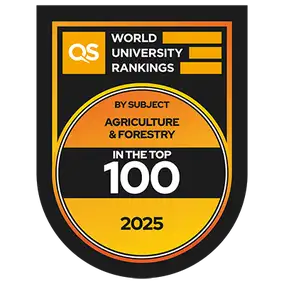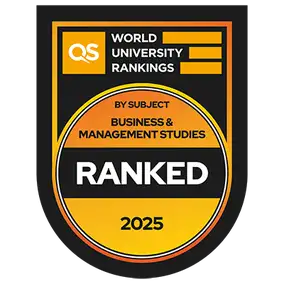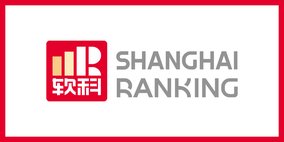- Where you can study
-
Distance and onlineManawatū campus (Palmerston North)
-
International students
International students are not New Zealand citizens or residents.
- Open to international students on campus in New Zealand
- Note:
- Note: Not all listed subject course options are on offer every year. Some distance courses contain compulsory contact workshops.
Specialise in International Agribusiness for your Bachelor of Agribusiness at Massey
Does managing the marketing process of meat, kiwifruit, or milk to retailers in Tokyo or Nestlé in Switzerland excite you? How about sourcing and processing billions of litres of milk every year?
In the Bachelor of Agribusiness (International Agribusiness) you’ll learn about the global agri-food system. This includes everything from on-farm procurement in New Zealand to export and distribution of food and other agricultural products to consumers around the world.
You’ll learn about
- production sciences
- agri-food value chains
- manufacturing
- distribution and logistics
- international finance, and
- the trade and marketing skills required to take New Zealand’s agri-food industry to the global marketplace.
Real-world experience
Your learning will focus on real-world case studies and will include field trips to provide the experience sought by employers.
Research-led teaching
Our staff are active researchers. Massey's Agribusiness qualifications integrate the most recent developments and thinking into your learning.
A growing, innovative industry
New Zealand’s economy is dominated by agriculture and food. It generates close to $37 billion in export earnings a year and international demand is predicted to continue to grow.
Relevant international knowledge
Massey’s Agribusiness qualifications align with agribusiness industries throughout the world. This ensures our graduates have the skills and industry knowledge employers want today and in the future.
Massey graduates and staff are helping to define the future of our nation’s agriculture and food businesses.
A Bachelor of Agribusiness in International Agribusiness is a good fit if you:
- are interested in agriculture and business
- want a career with an international perspective.
Planning information
Planning information
If you study full-time, in your first year, you’ll take eight 15-credit courses, making a total of 120 credits.
If you wish to study over two semesters, you should aim for 60 credits per semester. You may be able to take some courses at summer school. Make sure you include courses that are prerequisites for the next level of courses you wish to study.
Capstone course
‘Capstone’ courses are designed to be taken in your last year of study. This relies on you having completed the correct first and second year courses and ties your learning together. The capstone course for this qualification is 119373 Integrative Studies
Practical work requirement
There is a practical work requirement for this degree, consisting of at least 26 weeks full-time work. This is completed by submission of two reports for assessment. Practical work is normally done during summer vacations throughout the degree. Summer jobs are readily available on farms, orchards and other rural enterprises.
Course planning
Year One
115112 Accounting for Business
115113 Economics for Business
115114 Finance Fundamentals
115116 Introduction to Marketing
117153 Introduction to Animal Production in New Zealand
119120 Plants for Agriculture and Horticulture
119180 Introduction to Agribusiness
161140 Agri-Statistics
Year Two
112248 Food and Agribusiness Value Chains
115211 Business Law
119150 Practicum I* (0 credits)
152261 International Business
156231 Strategic Marketing Management
One course from:
119281 Decision Tools for Primary Industries
138255 Applied Engineering in Agriculture and Horticulture Systems
Three courses from:
115340 Sustainable Business Operations
125230 Business Finance
156232 Consumer Behaviour
152252 Project Management
178360 Sustainability, Environmental and Climate Change Economics
Year Three
112301 International Food and Agribusiness Strategies
112302 Food and Agribusiness Strategies
119250 Practicum II* (0 credits)
178312 Globalisation and Trade
119373 Integrative Studies
And four courses that can be a mix of International Agribusiness major courses (at 200 or 300-level) and electives, or electives only if you have taken 45 credits of International Agribusiness courses in year two. The level of electives will be determined by the choice of majoring courses: you need at least 75 credits (usually five courses) at 300-level overall.
*26 weeks of relevant practical work (2 x 13-week blocks of full time work). Work to be completed the summer prior to writing the reports.
Minors
Completing a minor is optional. Minors increase the breadth of your degree. They give you extra knowledge, attributes and capabilities.
A minor must be in a different subject from your major.
A Bachelor of Agribusiness (International Agribusiness) with a minor
You may choose a minor from any University undergraduate degree that has recognised minors. If the minor is from another undergraduate degree, the regulations of that qualification will apply.
An International Agribusiness minor (for students who are studying a different major or degree)
If you are not studying a Bachelor of Agribusiness (International Agribusiness) and wish to complete an International Agribusiness minor see the Bachelor of Agribusiness regulations for requirements.
Official regulations
To understand what you need to study and must complete to graduate read the official rules and regulations or this qualification.
You should read these together with all other relevant Statutes and Regulations of the University including the General Regulations for Undergraduate Degrees, Undergraduate Diplomas, Undergraduate Certificates, Graduate Diplomas and Graduate Certificates.
Returning students
For returning students, there may be changes to the majors and minors available and the courses you need to take. Go to the section called ‘Transitional Provisions’ in the Regulations to find out more.
In some cases the qualification or specialisation you enrolled in may no longer be taking new enrolments, so may not appear on these web pages. To find information on the regulations for these qualifications go to the Massey University Calendar.
Please contact us through the Get advice button on this page if you have any questions.
Courses you can enrol in
Courses you can enrol in
Course planning key
- Prerequisites
- Courses that need to be completed before moving onto a course at the next level. For example, a lot of 200-level courses have 100-level prerequisite courses.
- Corequisites
- Courses that must be completed at the same time as another course are known as corequisite courses.
- Restrictions
- Some courses are restricted against each other because their content is similar. This means you can only choose one of the offered courses to study and credit to your qualification.
Core courses for the Bachelor of Agribusiness
As well as the specialisation courses listed below, this qualification has core courses that you will need to complete.
Bachelor of Agribusiness core courses
International Agribusiness courses
Compulsory courses
Course code: 112302 Food and Agribusiness Strategies 15 credits
Extensive use of food industry and agribusiness case studies. Emphasis is placed on strategic analysis and decision making applied to New Zealand and international agribusiness
View full course detailsCourse code: 115116 Introduction to Marketing 15 credits
The course provides an understanding of the core concepts and practices of marketing.
View full course detailsCourse code: 117153 Introduction to Animal Production in New Zealand 15 credits
An introduction to animals and animal science in New Zealand, covering a broad range of animal species and incorporating the principles of nutrition, reproduction, lactation, genetics and growth. A brief overview of New Zealand’s livestock production systems and consideration of animal ethics, welfare and biosecurity issues.
View full course detailsCourse code: 152261 International Business 15 credits
A study of business and management from an international perspective. This course provides an introduction to the conduct of business in the global environment by exploring different forms of international business activity in the context of regionalism and globalism.
View full course detailsCourse code: 156231 Strategic Marketing Management 15 credits
A study of the decisions required to allocate and manage marketing resources in a competitive business environment.
View full course detailsCourse code: 161140 Agricultural and Horticultural Statistics 15 credits
An introduction to statistics in an agricultural and horticultural context, including the presentation, analysis and interpretation of quantitative data.
View full course detailsCourse code: 178312 Globalisation and Trade 15 credits
An examination of selected economic concepts to the operation of global trade, agribusiness and financial markets.
View full course detailsCompulsory course selection
Course code: 115340 Sustainable Business Operations 15 credits
A study of integrated business operations with sustainability as an integrating theme. Interdisciplinary perspectives will highlight the interconnections of environmental, social, cultural, and ethical concerns in business operations. Contemporary challenges will be examined through the lens of a range of organisations and business sectors.
View full course detailsCourse code: 125230 Business Finance 15 credits
The course provides students with a fundamental knowledge of financial theory and practice. In addition to valuation and capital budgeting, students will study working capital management, capital structure, the cost of capital, dividend policy and ethics in finance.
View full course detailsCourse code: 152252 Project Management 15 credits
An introduction to the theory and methods employed in project management.
View full course detailsCourse code: 156232 Consumer Behaviour 15 credits
A study of the theory and practice of changing consumer behaviour through marketing programmes. The course critically evaluates traditional cognitive models of consumer behaviour and alternative behaviourist approaches.
View full course detailsCourse code: 178360 Sustainability, Environmental and Climate Change Economics 15 credits
A survey of environmental and climate change issues and the application of economic analysis to these issues and policies to achieve sustainable outcomes.
View full course details15 credits from
Course code: 119281 Decision Tools for Primary Industries 15 credits
Application of decision tools for farm systems analysis at the tactical level. Analytical frameworks to assist decision-making in finance, human resources, production and marketing.
View full course detailsCourse code: 138255 Applied Engineering in Agriculture and Horticulture Systems 15 credits
Engineering principles underpinning the systems used in the growing, harvest and post-harvest treatment of agricultural and horticultural products. Emphasis is placed on deriving the system performance specification following consideration of capacity, product quality and safety, and ecological requirements.
View full course detailsEntry requirements
Entry requirements
Admission to Massey
All students must meet university entrance requirements to be admitted to the University.
Specific requirements
There are no specific entry requirements for this qualification, outside of university admission regulations.
English language requirements
To study this qualification you must meet Massey University's English language standards.
English language skills
If you need help with your English language skills before you start university, see our English for Academic Purposes (EAP) courses.
Fees and scholarships
Fees and scholarships
2026 tuition fees
- Domestic students: $7,415
- International students: $38,080
Tuition fees are estimates only. The exact fees charged will depend on which courses you select at the time of enrolment. The estimates are for full-time study (120 credits). Fees are in New Zealand dollars and include Goods and Services Tax (GST).
The estimates do not include the Student Services Fee. This fee is $1,164 for on-campus students and $948 for distance students for full-time study (120 credits). For more information about this fee and other fees you may need to pay, see non-tuition fees.
There may also be charges for things such as study resources, software, trips and contact workshops.
Course fees
You can view fees for the courses that make up your qualification on the course details pages.
Student loans (StudyLink) and Fees Free scheme
You may be eligible for a student loan to help towards paying your fees.
The New Zealand Government offers fees-free tertiary study for eligible domestic students. Find out more about the scheme, including how much could be covered and your eligibility on the Inland Revenue website.
Scholarship and award opportunities
- Massey University Undergraduate First Year Scholarship – School Leavers
- McEwan Pacific Student Scholarship
- New to Massey University First Year Student Bachelor of Agribusiness Scholarship
- Ted Delahunty Agribusiness Scholarship
Fees disclaimer
This information is for estimation purposes only. Actual fees payable will be finalised on confirmation of enrolment. Unless otherwise stated, all fees shown are quoted in New Zealand dollars and include Goods and Services Tax, if any. Before relying on any information on these pages you should also read the University's Disclaimer Notice.
Careers and job opportunities
Careers and job opportunities
New Zealand’s agribusiness sector is flourishing, and there is strong demand for graduates, from running large farm-based businesses through to international trade. Massey's Agribusiness qualifications bring in the most recent developments in both business and primary production, because we actively research in all our subjects. Therefore, you'll have the knowledge and foundation skills for several career paths.
Potential careers include
- business analyst
- business and industry leadership roles
- business management
- export and import
- businesses involved in international trade.
Practical experience while you study
During your degree you will gain a huge amount of practical experience. This experience will include at least 26 weeks of paid employment undertaken in agriculture and related sectors. That will give you an advantage with potential employers.
International students
International students
New Zealand is a great place to study. Massey University’s reputation is supported by our international rankings, accreditations and associations. We are rated five star plus by the QS World University Rankings.
Massey University has small class sizes, and our lecturers and staff are friendly and approachable.
As an international student, there are entry requirements that will apply to you. We recommend that you apply at least three months before your anticipated start date so your application can be processed in time. There are additional steps you will need to take. These include obtaining a visa and travel bookings if your study is to be in New Zealand.
Plan your courses
View your course options and plan your study using our course planner.
What our students say
“This degree allowed me to pursue my passions in agriculture and commerce, and also offered the flexibility to include a minor in politics. This allows me to combine knowledge, and see how sectors in society are connected. The thought provoking content is preparing us for a future where the market is ever-changing and every day may be different.”

“I have always believed that there is real value in workplace experience as it gives students the ability to apply their learning. The opportunity to work with i4 lead me to work on various projects and has exposed me to new challenges, ideas and initiatives. It has also taught me new soft skills, and broadened my career aspirations.”

Accreditations and rankings

QS Ranking - Agriculture and Forestry
Massey is world-ranked and New Zealand’s No 1 university in agriculture according to QS (Quacquarelli Symonds) rankings.

QS Ranking - Business Management Studies
Massey University is ranked by QS (Quacquarelli Symonds) as one of the top 500 universities for business and management.
Related study options
Farm Management – Bachelor of Agribusiness
At Massey, many of our agribusiness students have jobs before they even graduate. Learn how to build and deliver profitable and sustainable businesses.
Master of Agribusiness – MAgribus
Gain skills and knowledge sought by employers in New Zealand and internationally. Help address global challenges in the rapidly evolving feed, food, and fibre industries.
Postgraduate Diploma in Agribusiness – PGDipAgribus
Massey’s Postgraduate Diploma in Agribusiness is a stepping stone to a research-based degree such as a master’s degree.

